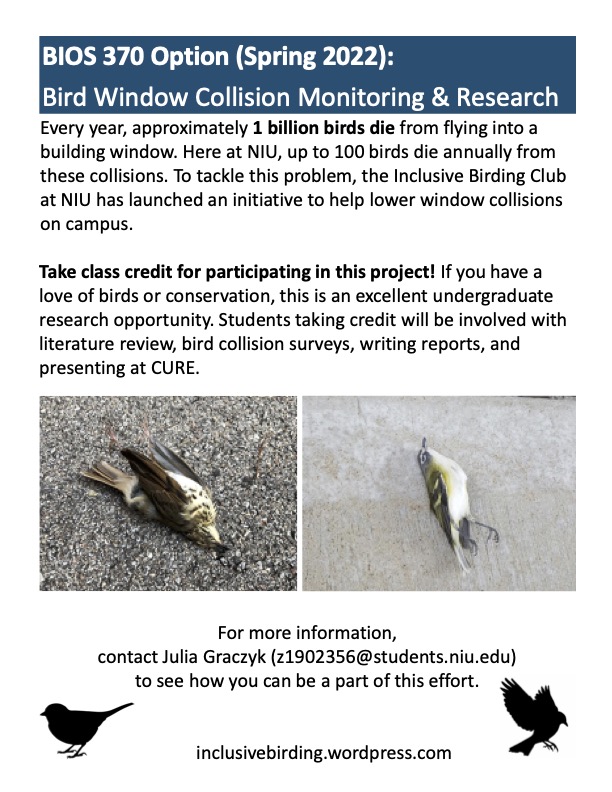Description:
The Inclusive Birding Club at NIU has launched a project to help solve the issue of bird-window collisions on campus and contribute to the understanding and prevention of this phenomenon on a broader scale. Students interested in participating in this project are eligible to take 1-3 credits of BIOS 370 (Directed Research in Biology). Under direction of the Inclusive Birding Club’s Conservation Coordinator, students can expect to become fully involved in project activities including: surveys, data entry, data analysis techniques, reading literature, summarizing scientific findings, writing scientific reports, and presenting project findings. This is an excellent opportunity for undergraduate students to become involved in an important scientific project, while also gaining important experience and skills related to biological research.
Grading:
BIOS 370 is graded on a Satisfactory/Unsatisfactory scale (S/U). To receive a satisfactory grade, students must perform assigned tasks completely and thoroughly as directed by the Conservation Coordinator and Instructor of Record. In addition to performing quality work, students must meet the minimum semester hours required of the credit load that is being taken. Students are eligible to take 1-3 credits per semester. Each credit requires a minimum of 45 hours of semester work.
Time Commitment:
It is up to the student to keep a detailed record of their hours spent on the project. An incomplete amount of hours spent by the end of the semester may result in an unsatisfactory grade. It is highly recommended that new students to the project take one credit of BIOS 370 unless additional arrangements are made (see Additional Credit). Below are examples of how you can expect to complete 45 hours of work for this project this semester.
· Bird-window collision surveys: Surveys will be conducted starting in late March and lasting through the end of the semester. Surveys are conducted early in the morning (starting at about 7AM) and lasting for about two hours. Students are expected to survey two mornings per week, adding up to about 20 hours of work this semester. Students are eligible to conduct more than two surveys per week if their schedules allow for it. However, students should not expect to be able to complete all of their semester hours through surveys alone.
· Literature review: A literature review is being conducted on prior scientific literature relevant to this project. Students can complete semester hours by reading articles, summarizing articles, and entering relevant data into a data file. Specific instructions will be given by the Conservation Coordinator. Students can expect to spend up to 15 semester hours on this task.
· Data analysis: Specific opportunities for entering, proofing, and analyzing data may arise as needed during the semester. The Conservation Coordinator with provide specific direction when the opportunity arises. Additionally, resources for learning how to analyze data in program R are available and time spent on these learning modules can count towards semester hours. Students can expect to spend up to 5 semester hours on this task.
· Project report: Students can submit an end of the semester scientific report on their involvement with the project. Project reports will be written in a scientific format (Intro, Methods, Results, Discussion) and give students and opportunity to summarize their involvement in the project, what they learned, and suggestions for improvement. A rubric for project reports will be provided to interested students. Students can expect to spend 5-15 hours on this task.
· Presentations: An opportunity to assist in the development and delivery of a poster or talk presentation at NIU’s Conference on Undergraduate Research and Engagement (CURE) is available to interested students. Presentations must be completed by April 11th and CURE takes place on April 26th. Participation in CURE will not be required unless a student is taking more than one credit.
Additional Credit:
For student wishing to take 2 or 3 credit hours, a separate plan of additional tasks must be created and approved with the help of the Conservation Coordinator. Each additional credit taken involves an additional 45 hours of semester work.
Course Registration:
Pick up a BIOS 370 form from the main office (MO 349), fill it out, and return it to Dr. Koop's office (MO 449) or drop it in her mailbox in the main office. Forms must be submitted to Dr. Koop by Thursday January 27th at 4PM in order to ensure course registration prior to the 1/30/2022 deadline.
Contact Information:
Conservation Coordinator: Julia Graczyk (z1902356@students.niu.edu)
Instructor of Record: Dr. Jen Koop (jkoop@niu.edu)
Grad Student Assistant: Tony Del Valle (adelvalle@niu.edu)
Grad Student Assistant: Carly Crow (ccrow2@niu.edu)
